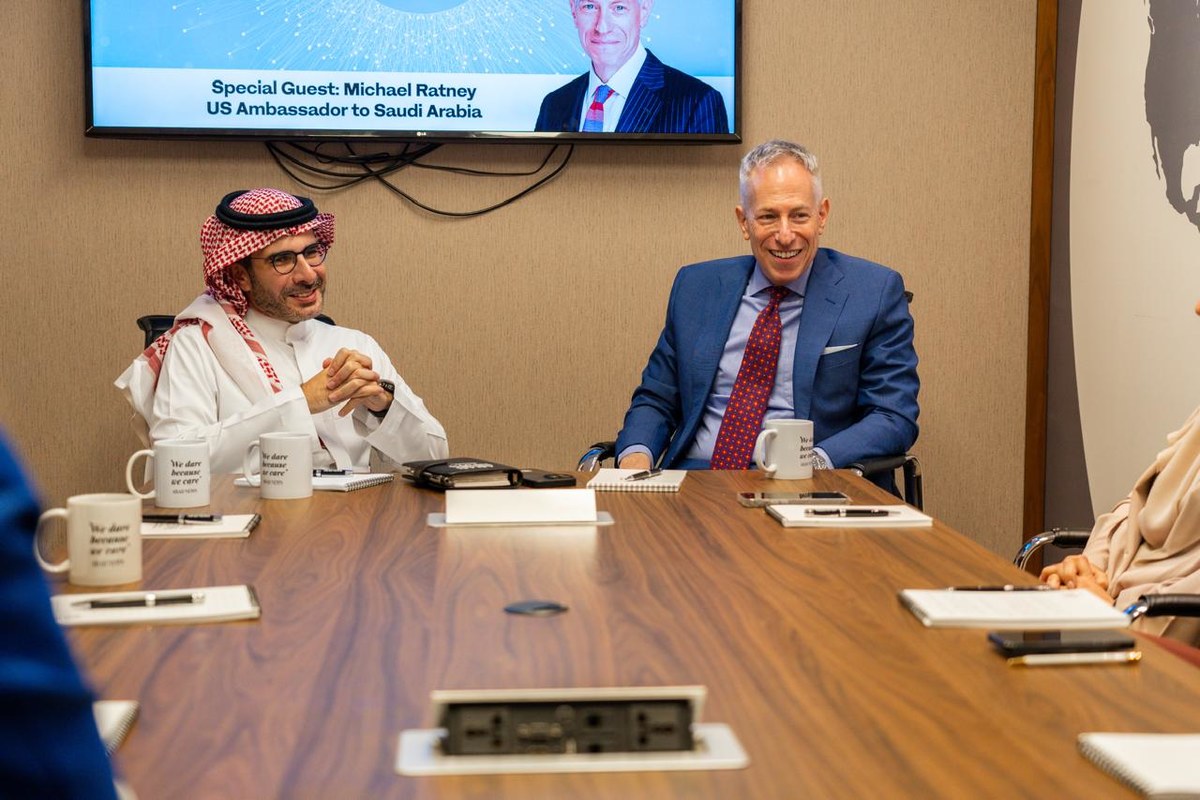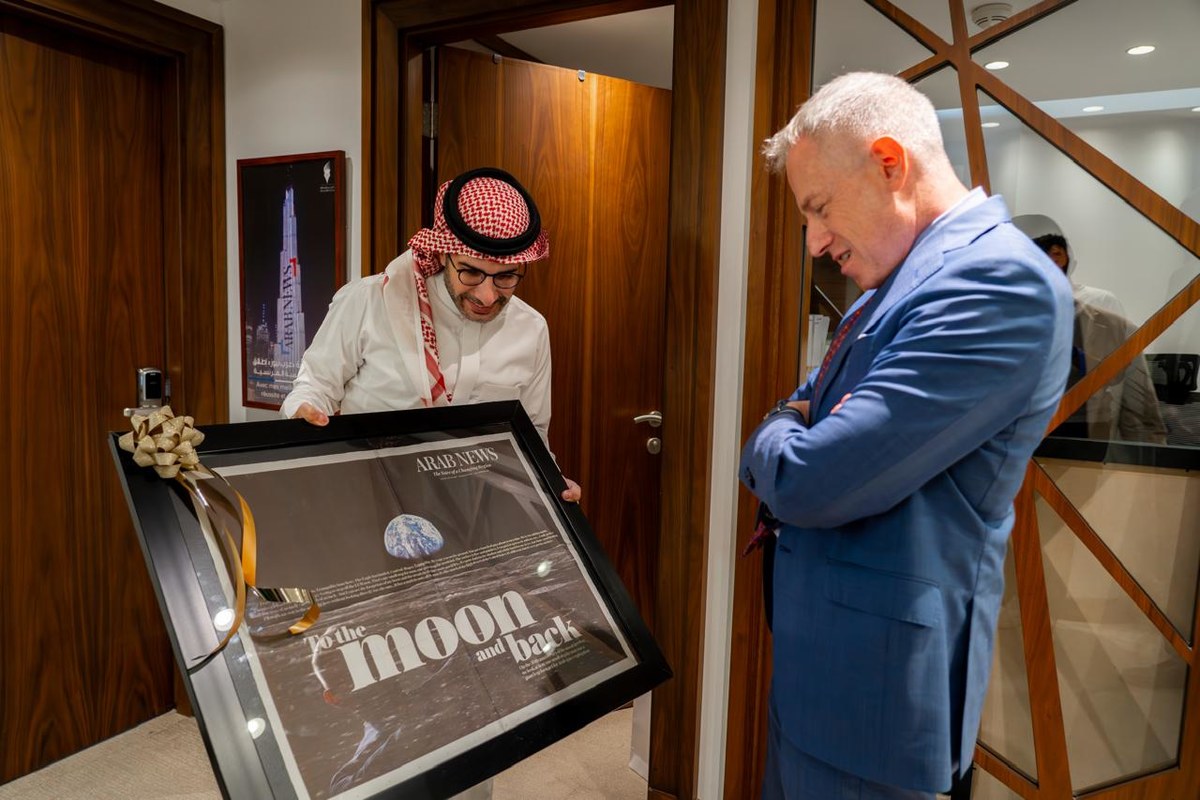DUBAI: Michael Ratney, the US ambassador to Saudi Arabia, has said that a “historic” security deal currently under negotiation between the two countries has the potential to fundamentally change the landscape of the Middle East for the better.
Appearing on the Arab News current-affairs show “Frankly Speaking,” Ratney was optimistic the deal would both clarify and cement the decades-old relationship — based at present on verbal agreements — between Saudi Arabia and the US.
“We overuse that word ‘historic’ but it would be a historic agreement and it could fundamentally change the landscape in the Middle East for the better,” he said.
“Political cooperation, security cooperation, economic integration.”
US Secretary of State Antony Blinken recently said the deal, which would see Saudi Arabia agreeing to normalize ties with Israel in exchange for closer US integration and recognition of a Palestinian state, could be just weeks away.
Despite the mutual enthusiasm for the deal, Ratney would not be drawn on the exact timeline for its conclusion, warning there were many moving parts, in particular the willingness of Israel to hold up its end of the bargain.
“I don’t think there’s anybody involved in these negotiations that wouldn’t like to have it finished tomorrow,” Ratney told Katie Jensen, the host of “Frankly Speaking.”
“But since all of that is a part of this agreement and these are extraordinarily complex and detailed discussions, I don’t think I could put a timeline for it.
“There ar also other elements of it including a US Senate role and obviously the situation in Israel weighs on this as well.
“So as much as we would like to get this done tomorrow, we are going to proceed as quickly as we can, as seriously as we can. And we’re going to get this done as soon as all of the pieces fall into place.”

Appearing on the Arab News current-affairs show “Frankly Speaking,” Ratney was optimistic a Saudi-US deal would both clarify and cement the decades-old relationship. (AN Photo)
What makes the deal so significant is that it clearly sets out the parameters of the Saudi-US relationship and safeguards them against the political whims and particularities of future US administrations, lending the partnership a degree of certainty.
“That’s why it’s an agreement that would involve US Senate ratification,” said Ratney. “US Senate ratification means it is a formal agreement that doesn’t depend on a particular administration.
“It would be an enduring agreement not between an administration or a government but between two countries. And in that, that brings certainty. It brings certainty to us. It would bring certainty to the Saudis as well.”
Commentators have drawn parallels between the proposed Saudi-US deal and the Treaty of Mutual Cooperation and Security between the US and Japan, signed in 1960. Asked whether these assessments were accurate, Ratney said he could not go into specifics.
“I’m really reluctant to get into those sorts of details,” he said. “Those are exactly the kinds of things that are subject to negotiations at the highest level of our government and the highest level of the Saudi government.”
He did, however, say the deal would include upgrades to the security partnership and economic relations, while also taking steps toward meeting Saudi Arabia’s demand for an independent Palestinian state alongside Israel.
“Let’s just say this would be a historic agreement that would upgrade the security partnership between the United States and Saudi Arabia. It would upgrade the economic relationship. It would bring Israel and Saudi Arabia essentially into the same region. And it would bring benefits and a path to statehood for the Palestinians.
“So, that’s a lot. It’s a complex set of discussions. And I’m really reluctant to get into the details of things, some of which are still yet to be negotiated.”
The success of the deal hinges to a significant degree on Israel’s cooperation. However, the government of Benjamin Netanyahu, which has two powerful far-right ministers, has been reluctant to give way on Palestinian statehood and end the war in Gaza.
Ratney, who previously served as a diplomat in Israel, said there was much to be gained for the region.

Michael Ratney, the US ambassador to Saudi Arabia, met with Editor-in-Chief Faisal J. Abbas and other Arab News journalists during a visit to the headquarters of the newspaper in Riyadh on May 30. (AN Photo)
“I would say all the elements that we have discussed are of extraordinary value. The real value is taking it all together,” he said.
“All of those elements that have been under discussion, all of the US-Saudi pieces and the Israel and the Palestinian pieces taken together could fundamentally change the landscape of this Middle East.
“And that is the lens through which we see it and it’s certainly the lens through which the US Senate sees it and they ultimately would have a vote to ratify it.”
However, US lawmakers have been reluctant to pressure Israel to accept a ceasefire in Gaza. Asked whether Washington’s decisions could radicalize a generation of Arab and Muslim youth and create a Hamas 2.0, Ratney said careful diplomacy was required to achieve a lasting peace.
“It’s impossible for anyone who watches these scenes on a daily basis, and it’s certainly impossible for anyone that knows friends and family who have been engulfed in this conflict, not to be moved by it, and not to be motivated to find a solution as soon as possible, to find an end to the violence in Gaza, to find an end to the threats to Israeli security, to find a path to statehood, so that this sort of, for Palestinians, to ensure that this sort of conflict doesn’t resume,” he said.
“The diplomacy involved with that is extraordinarily complex, and there’s areas that we pursue, and there’s positions that we take that sometimes aren’t popular, but they’re based on our sense of the most expeditious, the most effective way of pursuing it.”
Ratney was further challenged by Jensen, who asked him whether the whole world could be wrong on Israel and why the US appears reluctant to listen to its closest allies and apply firmer pressure on its ally.
In response he said: “I think it’s safe to say that both President Biden, Secretary Blinken, all of our senior officials, have been heavily involved. This has been a major preoccupation of theirs since the outbreak of violence on Oct. 7.
“They have been in the region steadily. Secretary Blinken has been here six times since October 7, our national security adviser as well. In almost every case, that involves visits to Israel as well, where they have, sometimes, very difficult and very direct conversations.
“We have an important relationship with Israel, we have an important partnership with Israel, and we utilize that relationship and partnership to find a decent end to this conflict.”
Saudi Arabia and the US had differences of opinion on regional issues after the Biden administration took office in 2020. However, after President Biden visited the Kingdom in 2022, the differences have made way for greater convergence of opinions.
Ratney, who has been ambassador to Saudi Arabia for a year, said the bilateral relationship was already better when he took up his posting, and that there was potential for even stronger ties.

Ratney, who previously served as a diplomat in Israel was speaking to Frankly Speaking’s Katie Jensen. (AN Photo)
“When I got here a little over a year ago, the relationship felt like it was in a good place. And I do think that’s the case. And I think over the last year, it has gotten better and better as our partnership has diversified, as we’ve delved into negotiations over a potential historical agreement between our countries.
“So, if I look ahead a year, two years, three years, what I’d like is that trajectory and the speed of that diversification and partnership to continue.”
Ratney said he has been impressed by the pace and scale of change in the Kingdom in recent years, particularly the empowerment of women — least of all the lifting of the ban on women driving.
“Women driving is really the tip of the iceberg,” he said. “The big change, the big innovation — and it has fundamentally changed the face of this country — is the fact that women are involved in every aspect of the economy, in every aspect of society.
“And that’s as simple as me going into meetings with senior government officials and seeing women are full participants in these discussions.
“And they’re not there as symbols. They’re highly educated, in many cases, as well-educated or better educated than their male counterparts, often at US universities. And it’s an extraordinary thing to see.”
Turning to areas of cooperation and opportunities between the US and Saudi Arabia, Ratney said there was now scope for trade and exchange in high technology and the creative industries.
“We work heavily with US companies that become intrigued by this market, to export to this market, to partner with Saudis here and invest here, and we see it in areas like not just healthcare, but infrastructure,” he said.
“Obviously, this country is making huge investments in infrastructure and US companies bring real value there. In high tech, Saudi Arabia has ambitions to become a hub for innovation and technological development.
“That in many ways is a US brand, and so US companies, whether Amazon or Google or others, are here, are interested, are involved, and are becoming partners with Saudis in those efforts.
“In the past, there was never much of a film industry here. Now we see US film and television companies interested in partnering with Saudi’s nascent film industry. That’s just extraordinary as well. So across the whole economy, we see opportunities for the US.”

Michael Ratney, the US ambassador to Saudi Arabia, was shown a special edition of Arab News by Editor-in-Chief Faisal J. Abbas during a visit to the headquarters of the newspaper in Riyadh on May 30. (AN Photo)
Some commentators have suggested that the US has lost business to China in the scramble for contracts in the Kingdom, particularly in relation to technology and communications.
“Are there competitors: Europeans, Chinese? Sure,” Ratney said. “But I have to say, where China might bring low price to the table, what the US brings is value and it brings innovation and it brings partnership, in a way that very few competitors can match.”
Another area of future cooperation is the space sector.
“To listen to the Saudi leadership talk about it, I think, quite rightly, a space sector, a commercial space sector, is becoming increasingly a normal part of any big healthy economy,” Ratney said.
“It was Axiom Space, a US company, that put two Saudi astronauts last year to the International Space Station — an air force pilot and a microbiologist. The Saudis clearly have further ambitions there as well, and we want to be a part of that.”
He added: “Space, commercial space in particular, is the future, and it is an extraordinarily lucrative and extraordinarily ambitious future.”
Although he is only a year into his posting as US ambassador to the Kingdom, Ratney is already looking ahead to the legacy he wants to leave.
“As Saudi’s ambitions expand, whether it’s expanding and reforming their educational sector, building a larger media sector, the space exploration that we talked about, building a high-tech industry, a whole range of areas where the US and Saudi are natural partners, I would like to see a few years from that for everybody to know about that and for Saudi to be succeeding in its ambitions and for the US to be seen as its number one partner as it does so.”




























